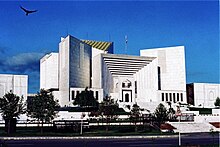Alvin Robert Cornelius الوین رابرٹ كورنيليس | |
|---|---|
 | |
| 4th Chief Justice of Pakistan | |
| In office 13 May 1960 – 29 February 1968 | |
| Appointed by | Ayub Khan |
| Preceded by | Muhammad Shahabuddin |
| Succeeded by | Sheikh Abdur Rehman |
| Chairperson of the Pakistan Cricket Board | |
| In office 1949 – 14 May 1953 | |
| President | Ayub Khan |
| Preceded by | Ayub Khan |
| Succeeded by | Muzafar Hussain |
| Minister of Law and Justice | |
| In office 1969 – 16 December 1971 | |
| President | General Yahya Khan |
| Personal details | |
| Born | 8 May 1903 Agra, United Provinces, British India |
| Died | 21 December 1991 (aged 88) Lahore, Punjab, Pakistan |
| Spouse | Ione Francis |
| Children | 2 |
| Alma mater | University of Allahabad Selwyn College, Cambridge |
| Awards | Hilal-i-Pakistan |

Alvin Robert Cornelius, H.Pk (8 May 1903 – 21 December 1991) was a Pakistani jurist, legal philosopher and judge, serving as the 4th Chief Justice of Pakistan from 1960 until 1968. In addition, he served as Law Minister in the cabinet of Yahya Khan, 1969 – 16 December 1971.
Cornelius was born in Agra, United Provinces of Agra and Oudh in British India, to an Urdu-speaking Anglo-Indian Roman Catholic family. He did his schooling at St. Peter's College, Agra. Cornelius graduated from the University of Allahabad and Selwyn College, Cambridge. He was commissioned into the Indian Civil Service and was the assistant commissioner in the Punjab, starting his judicial career in the Lahore High Court in 1943, later joining the Justice department of the Punjab government. During this time, Cornelius became a recognised jurist, publishing important textbooks in Pakistani legal history during his career. Cornelius also became a leading activist for the Pakistan Movement.
In 1946, Cornelius was elevated to associate judge of the Lahore High Court; opting for Pakistan, Cornelius became an important figure in country's legal history. Initially serving as the law secretary for Law Minister Jogendra Nath Mandal and Prime Minister Liaquat Ali Khan, Cornelius played an integral role in setting up the court system while advising the law minister and the prime minister. Among his notable cases were actions defending non-Muslims' rights (Freedom of religion), the Bogra case against presidential reserve powers (see the inactive Article 58(2)B of the VIII Amendment to the Constitution of Pakistan), defending workplace and labour laws, and sports law in regard to the Pakistan Cricket Board. Cornelius was regarded as a man of justice, fighting against religious extremism and religious discrimination, warning, in these regards, against "A general feeling of despair, a widespread lack of confidence... and a common readiness to anticipate the worst".[1]
In 1960, President Ayub Khan nominated Cornelius to the Chief Justiceship of Pakistan; rivals for the position were briefly discussed, but eventually he was elevated to the position.[1] Alvin Robert Cornelius became the first Christian Chief Justice, becoming one of the most famous and influential figures ever to serve on the Supreme Court.[1] After his departure from the Court, Cornelius remained influential and was a symbol of the protection of the rights of minorities and freedom of religious practices, whilst serving as the legal adviser to successive governments on judicial matters.[1]
- ^ a b c d Gabriel, Theodore P. C. (2007). Christian citizens in the Islamic state: Pakistan experience. England, United Kingdom: Ashgate Limited. p. 120. ISBN 978-0-7546-6024-8.